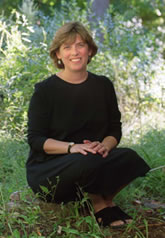Heidi Hammel: Ask for help when you need it
 Heidi Hammel is a senior research scientist and Co-Director of the Research Branch at the Space Science Institute. She is an Interdisciplinary Scientist for the James Webb Space Telescope (JWST) scheduled for launch in 2013 and a member of the Science Working Group for the Giant Segmented Mirror Telescope. She has been honored with the DPS Carl Sagan Medal, named one of Discover Magazine’s 50 Most Important Women in Science, and she is a AAAS Fellow.
Heidi Hammel is a senior research scientist and Co-Director of the Research Branch at the Space Science Institute. She is an Interdisciplinary Scientist for the James Webb Space Telescope (JWST) scheduled for launch in 2013 and a member of the Science Working Group for the Giant Segmented Mirror Telescope. She has been honored with the DPS Carl Sagan Medal, named one of Discover Magazine’s 50 Most Important Women in Science, and she is a AAAS Fellow.
Dr. Hammel’s publication record is extensive and varied; three recent examples are:
- Hammel, H. B. et al. Jupiter After the 2009 Impact: Hubble Space Telescope Imaging of the Impact-generated Debris and its Temporal Evolution. The Astrophysical Journal Letters, Volume 715, Issue 2, pp. L150-L154 (2010).
- Hammel, H. B.; Sromovsky, L. A.; Fry, P. M.; Rages, K.; Showalter, M.; de Pater, I.; van Dam, M. A.; Lebeau, R. P.; Deng, X. The Dark Spot in the atmosphere of Uranus in 2006: Discovery, description, and dynamical simulations. Icarus, Volume 201, Issue 1, p. 257-271.
- Luszcz-Cook, S. H.; de Pater, I.; Ádámkovics, M.; Hammel, H. B.Seeing double at Neptune’s south pole. Icarus, Volume 208, Issue 2, p. 938-944.
1. When did you first become interested in space science?
I took an elective class in college in astronomy during my sophomore year. It was fun, so I took the follow-up course. One thing just led to another, and I ended up with a PhD in astronomy.
I am fascinated by the delicate balance of external radiation from the Sun and the internal heat from these planets. This balance seems metastable, particular for Uranus but also for Neptune, leading to detectable signatures in their atmospheric activity of the seasons and solar activity. We do not fully understand the physical processes involved in the balance, and yet it is the same balance that occurs in the Earth’s atmosphere. In other words, by studying other planets, we learn about Earth, and knowledge of Earth is incredibly important to us as a species.
Working in interdisciplinary research is both challenging and enriching. There are more meetings, but there are more opportunities as well. As to how to handle the travel: be sure to hit the major meetings in your field(s), and try to be strategic about other meetings. Some meetings are webcasting now, too, which helps. Staying current with journals is tough. I do read Science and Science News, and scan the tables of contents of Icarus, ApJ, and AJ. I use ADS notifications to get alerts about papers/topics/authors that might interest me. I encourage young people to branch out and try new ideas, new techniques, new fields. It will make them more effective scientists, and it is just plain fun.
As discussed in the recent decadal survey “New Worlds, New Horizons,” the demographics of our community have been changing faster than our institutions. In other words, there are a lot more young people looking for a lot fewer “traditional” faculty jobs. I’ve never held a professorship, yet I’ve managed to maintain a great astronomy career. I encourage postdoctoral fellows to consider their options in the broad context beyond academia: decide what they really like to do and figure out a way to do that, rather than assuming a faculty job is “the goal.”
As a single mom of three school-age children who works full time and travels a lot for my job, I absolutely rely on my neighbors, friends, and family. I am fortunate that my mother is sometimes available to help with childcare. I have a housekeeper who comes once a week who’s worth every penny I pay her. Carpools are critical, as are WebEx and teleconferences (invest in a good polycom system). I’ve learned that on a day-to-day basis, there is no such thing as balance, so I do not try strive for it. I plan as far ahead as I can, take each day as it comes, and just pick up the phone and call for help when I need it. That last bit is the most important. None of us is capable of “doing it all” in isolation. Ask for help whenever you need it, thank all your helpers on a regular basis, and try to help others whenever you can.
Dr. Hammel is being featured here as one of 51 Women in Planetary Science, a series of interviews with successful women scientists on career choices, sequencing, publishing, review panels, and other tips for success. Questions or suggestions for future interviews can be sent to us directly or to our email list, which all women in planetary science can join!


